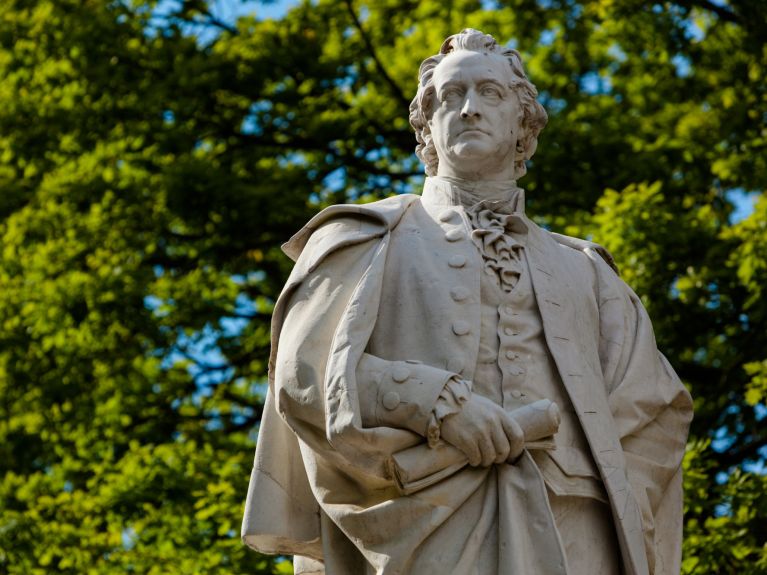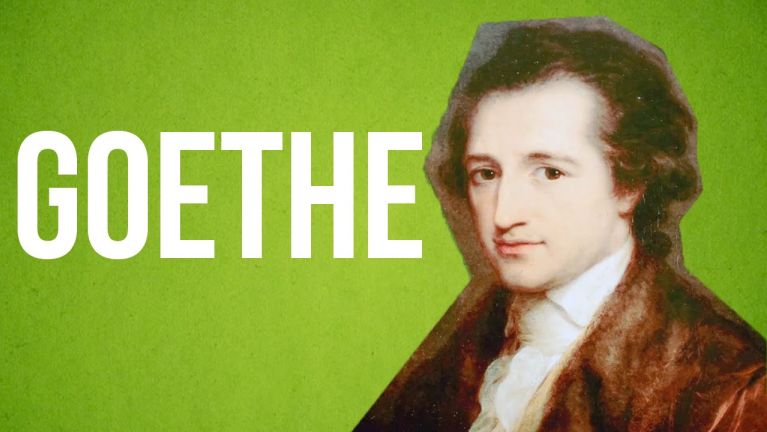Johann Wolfgang von Goethe: a genius, even beyond literature
Goethe shaped German culture like no other. His persistent thirst for knowledge was his greatest motivation.

“After all, a learned man studies hard, and does the best he can. So one builds a respectable house of cards that greater minds can’t finish afterwards.” These words from Goethe’s “Faust: The Second Part of the Tragedy” do not only reflect his wisdom as a poet and thinker but also his own philosophy of life.
Johann Wolfgang von Goethe, born on 28 August 1749 in Frankfurt on Main, strove for knowledge and personal fulfilment, even at a young age. The Goethe family was held in high esteem in Frankfurt, and Johann Wolfgang grew up in a wealthy home. This is why, unlike other boys his age, Goethe did not attend a normal school. Instead, he and his sister Cornelia were taught by a private tutor in subjects including history, Latin and Greek.
Into old age, Johann Wolfgang von Goethe continued to satisfy his curiosity as a poet, thinker and naturalist, enabling him to shape German culture like no other. His works receive worldwide recognition to this day.
Fact sheet
Name: Johann Wolfgang Goethe, from 1782 von Goethe
Born on: 28 August 1749 in Frankfurt on Main
Died: 22 March 1832 in Weimar
Wife: Christiane von Goethe, née Johanna Christiana Sophia Vulpius
Children: five, but only Julius August Walther von Goethe reached adulthood
Goethe’s transformation from lawyer to poet
When he was only 16 years old, Johann Wolfgang left the family home to move to Leipzig for his studies. In autumn 1765 he started to study law at the University of Leipzig, following his fathers wishes. However, rather than focussing on the content of his course, young Goethe preferred to pursue artand literature. He wrote his first poems and attended poetry readings.
Following a severe illness, Goethe initially returned to his parents’ house in 1768, before continuing his studies in Strasbourg in 1770, where he was able to focus on his law degree more effectively. Nevertheless, his thirst for knowledge also led Goethe to lectures about chemistry and botany. During his time in Strasbourg, Goethe met the writer and theologist Johann Gottfried Herder, who introduced him to authors such as Shakespeare and Homer, thus contributing considerably to his literary development.
After completing his degree, Goethe returned to his hometown Frankfurt in 1771, where he opened a small law firm. In this time, he neglected his legal work once again and published his work “Götz von Berlichingen”. The book was received enthusiastically by the public and is considered to be among the first works of the Sturm und Drang epoch. Goethe’s European breakthrough followed in 1774. He wrote the epistolary novel “The Sorrows of Young Werther” in only four weeks, and the name Goethe quickly became famous across Europe.
Dieses YouTube-Video kann in einem neuen Tab abgespielt werden
YouTube öffnenThird party content
We use YouTube to embed content that may collect data about your activity. Please review the details and accept the service to see this content.
Open consent form
The start of an era: Goethe in Weimar
This was how the Duke Carl August of Sachsen-Weimar-Eisenach, who was only 18 years old at the time, heard about Goethe. He summoned 26-year-old Goethe to join the court as a civil servant, where he worked as a minister and as leader of the Court Theatre, among other tasks. His new duties left him little time for his literary work, nevertheless, he created some famous works in this period of his life, such as the ballad “Erlkönig”.
However, this was not enough for Johann Wolfgang von Goethe, and the poet experienced a personal crisis, after ten years of working as a civil servant in Weimar. He decided to go to Italy to overcome this crisis, and virtually fled from court, calling himself Johann Philipp Möller to avoid being recognised in public. Goethe himself referred to his trip to Italy as his renaissance.
Back in Germany, Goethe first met his future companion Friedrich Schiller in 1788. The two men did not form a connection at first, but went on to become close friends later in life. They worked together and sent each other comments on their work. Together they shaped the period of Weimar Classicism.
Johann Wolfgang von Goethe and “Faust”
Goethe was deeply saddened when he learned that Schiller had passed away in May 1805. In a letter to his friend, the musician Carl Friedrich Zelter, he wrote that he had lost not only a friend but “half of my existence”. Devastated by the death of his friend, Goethe started to work on “Faust” again.
He’d started working on his work known as “The Urfaust” as early as 1770. However, this version is missing some crucial elements of the later work, such as the pact with the devil.
Here I am Man: here, dare to be!
The final work “Faust: The First Part of the Tragedy” is published in 1808, while the second part was not published until after Goethe’s death in 1832. Goethe’s “Faust” is considered one of the greatest works in world literature. The pursuit of knowledge and happiness that had been Goethe’s lifelong motivation is also the central theme of “Faust”.



